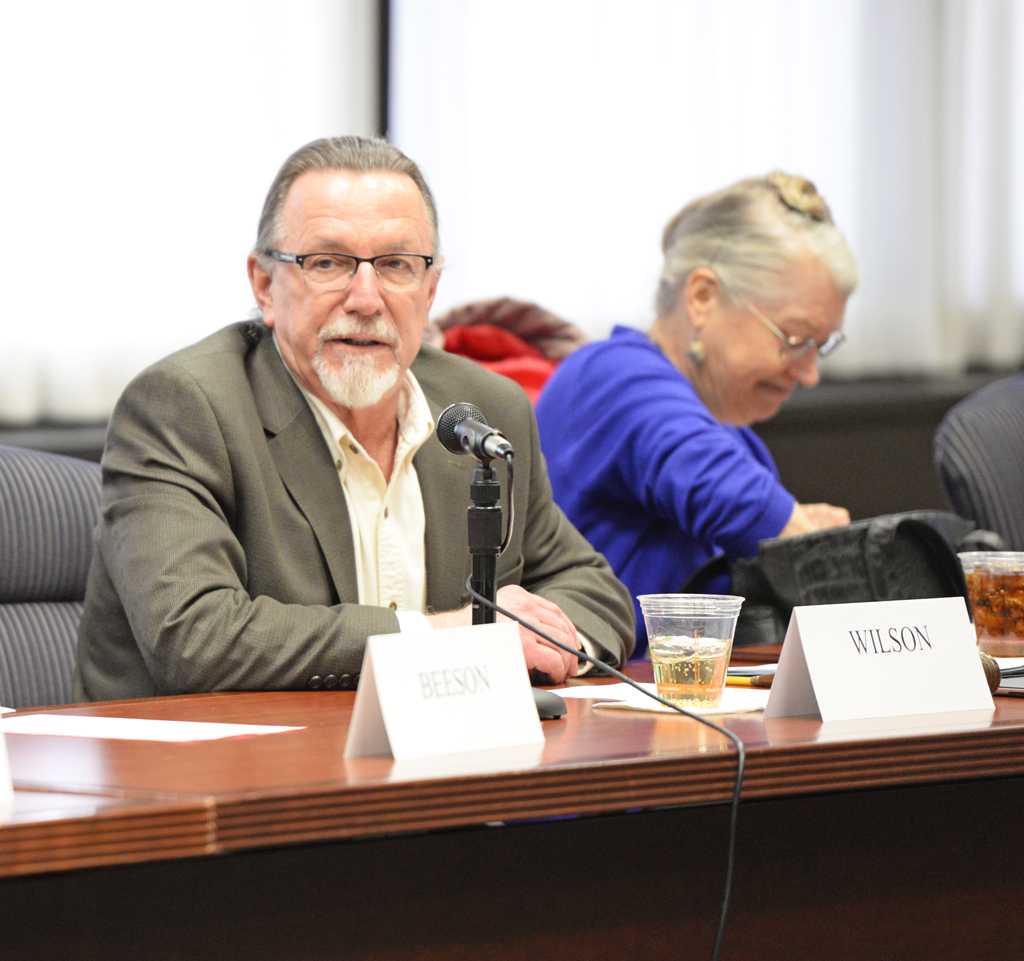University Senate talks diversity, assaults and budget impasse


Frank Wilson, University Senate Council President, discussed the state budget impasse and diversity and inclusion at Wednesday afternoon's council meeting. Nikki Moriello | Senior Staff Photographer
Pitt’s graduate and undergraduate student governments, along with other members of a working group, have called on the University Senate Council to commit to focusing on diversity and inclusion in the 2016-2017 school year.
At Wednesday’s monthly Senate Council meeting, council members listened and responded to the proposition, where Student Government Board and the Graduate and Professional Student Government outlined four concrete initiatives focusing on diversity and inclusion. Chancellor Patrick Gallagher and Frank Wilson, president of the University Senate Council, called on students, faculty and staff to urge state legislators to pass a budget, as well.
Here are three takeaways from the meeting:
Diversity and Inclusion group propose Year of Diversity and Inclusion for 2016-2017
The Senate Council Group on Diversity and Inclusion presented four potential courses of action to make Pitt more diverse and inclusive.
As a foundation for the initiatives, SGB president Nasreen Harun, SGB members Everett Green, Meghan Murphy and Natalie Dall, GPSG president, Joseph Kozak and other members of the Group suggested revamping The Pitt Promise. The Pitt Promise is currently an ethical conduct code for Pitt students. Students, faculty and staff would have the opportunity to sign the contract, promising to adhere to new standards of ethical guidelines.
“People need to know [The Pitt Promise] exists and know that it clearly states who we are and our values,” Kozak said. “The Promise needs to be a major part of the University.”
Dominique Johnson, a communication graduate student and head of the GSPG Sexual Assault Task Force, said the Promise will introduce a system for when people act counter to it that includes a way to reinforce it as a part of Pitt community.
The pitch for a reworked Promise set the tone for the next SGB-GPSA proposition — making the academic year of 2016-2017 the year of diversity and inclusion. Seeing the success of the Year of the Humanities, Harun said this proposition will bring diversity and inclusion to the forefront of the University’s focuses.
“The grants and incentives that come from designating [2015-2016] as the Year of Humanities has really made people think about this topic,” Harun said.
According to the Group, implementing these initiatives will begin at the next Senate meeting, which he hopes to designate to discussing diversity and inclusion in greater detail.
The meeting would offer Senate members a chance to extensively discuss diversity and inclusion as abstract concepts.
The SGB representatives also proposed an advisory council specific to the Office of Affirmative Action, Diversity and Inclusion. The goal of the council, according to Johnson, would be fostering long-term commitment at every level of the University and facilitating conversations about diversity that would lead to solutions.
“The Senate is the most appropriate place for this to begin,” Kozak said. “We want to include feedback from all of you and your constituents.”
Gallagher discusses recent influx of crime alerts
Gallagher said after four sexual assaults in Oakland within two weeks, various local news outlets reported on the influx. Gallagher stressed that there is no evidence for any sort of increased risk for Pitt students. Both the Pitt police and city police are still investigating the separate cases, but Gallagher said there is no “serial” trend related to the incidents.
“I want to highlight that we do live in urban environment, so it’s important for everyone to be responsible,” Gallagher said. “We’re hiring more Pitt police, there are more self-defense classes and the University is using social media and text messaging for crime alerts.”
Gallagher said students’ willingness to come forward about assaults signifies a positive step up, regarding campus climate.
Interim Vice Provost and Dean of Students Kenyon Bonner said assaults like those over the last two weeks are inevitable in an urban setting, but that doesn’t make them unimportant.
“Even one incident is concerning to the University,” Bonner said.
Pitt expected to get nearly $150 million from the state when budget passes
The Pitt Board of Trustees proposed increasing financial aid and employee salaries for Pitt’s budget this year, but Pennsylvania’s state budget — due eight months ago — still has not passed.
“Not having $150 million is real,” Gallagher said. “I don’t think we’ll see precipitous effects, but it could erode the long-term financial standing of the University.”
Wilson and other members encouraged faculty and staff to get more involved by writing letters to their representatives and asking their colleagues to do the same. He asked that as many people as possible attend Pitt Day in Harrisburg March 22, so the University’s push for state legislators to pass the budget is firm and clear.
“We need to make Pitt Day [in Harrisburg] a show of strength in numbers,” Wilson said. “We need to ask them why state universities aren’t appreciated.”
Wilson requested a deeper level of political engagement from all students and staff, but specifically called on Paul Supowitz, vice chancellor for community and governmental relations.
Wilson proposed that Pitt faculty and staff push for a referendum of the legislature, suspending the representatives’ bonuses and pay in the same way that Pitt’s have been frozen.
Supowitz said students, faculty and staff can urge legislators to pass a budget through direct requests.
“Students, as well as all other members of the Pitt community — alumni, staff and friends — can all make a difference by contacting their state representative, senator and Gov. [Tom] Wolf to implore them to put aside partisan differences on other issues,” Supowitz said in an email.
Wilson also encouraged students to engage the budget issue. He suggested students also write to their representatives, but he said the best results come from students attending Pitt Day in Harrisburg.
“Personal contact really made the difference last year in getting results,” Wilson said. “It’s a lot harder for legislators to look [students] in the eye and answer that they’re screwing you.”
Correction: A previous version of this story stated that SGB and GPSG introduced the four diversity and inclusion initiatives. It was the Senate Council Group on Diversity and Inclusion, which includes SGB and GPSG, that introduced the initiatives. The story has been updated.
Recent Posts
Opinion | School should be in the summer
Although this may be controversial, I believe that from this data, it is evident that…
Weathering the storm: Pittsburgh teams have tackled some of the toughest environments
The end of the year in western Pennsylvania is always marked by two things —…
Notes From an Average Girl // Notes on Book Banning
In this edition of Notes From an Average Girl, senior staff writer Madeline Milchman writes…
To Be Honest // Yup, it is that damn phone
In this edition of To Be Honest, staff writer Evin Verbrugge writes about her phone…
Meaning at the Movies | Portraying Toxic ‘Adolescence’
In this edition of Meaning at the Movies, staff writer Lauren Deaton explores the mini-series…
Opinion | Climate change requires radical, immediate action
Contributing editor Emma Hannan talks about the effects of climate change and the actions cities…
